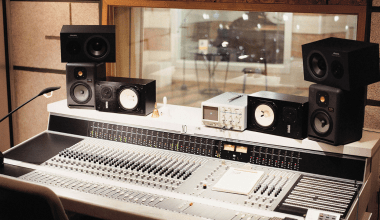The music industry can feel like a whole new world if you’re just starting out. From contracts to production, and marketing to royalties, the industry is filled with its own unique set of terms. Learning these music industry words can make all the difference when you’re navigating your career. This guide is here to break down the jargon and help you communicate confidently with other professionals in the business.
Why Understanding Music Industry Words is Important
Before we dive in, let’s talk about why this matters. Knowing the right terms isn’t just about sounding smart; it’s about:
- Building Credibility: When you speak the same language as industry professionals, you’re taken more seriously.
- Avoiding Miscommunication: Misunderstanding common terms can lead to costly mistakes.
- Navigating Deals and Contracts: Legal and financial jargon is a big part of the business, and understanding it can protect your interests.
Ready to jump in? Let’s start with the basics.
Key Music Industry Words Every Beginner Should Know
1. A&R (Artists and Repertoire)
This term refers to the department in a record label responsible for scouting talent and helping artists develop their sound. If someone says, “I’ll pass this to A&R,” it’s a big deal.
2. Royalties
Royalties are payments made to rights holders (like artists, songwriters, and producers) whenever their music is used or sold. There are different types, such as mechanical royalties and performance royalties.
3. Sync Licensing
This is the process of licensing music for use in films, TV shows, ads, or video games. If you’re looking to make money from sync licensing, you’ll need a good understanding of publishing rights.
4. Publishing
In the music world, publishing refers to the rights to a song’s composition. Songwriters and composers often sign deals with publishing companies to help them collect royalties.
5. Master Recording
The master recording is the original version of a song. Whoever owns the master (often the record label) controls how the song can be used and earns a significant share of the profits.
Breaking Down Contracts and Agreements
Understanding the language of contracts is crucial for anyone in the music business. Let’s look at some key terms you’re likely to encounter:
1. Advance
An advance is a lump sum of money given to an artist by a record label, publisher, or distributor. It’s like a loan that’s recouped from future earnings.
2. Recoupment
This refers to the process of the label or publisher recouping their advance or other expenses from an artist’s earnings. Until they’ve recouped, you might not see any royalties.
3. Term
The term of a contract defines how long it will last. Some contracts might lock you in for years, so it’s important to pay attention to this.
4. Territory
This term refers to the geographical area covered by the agreement. For example, some contracts are for worldwide rights, while others are limited to specific countries.
Understanding the Production Process
Making music isn’t just about creativity; it’s also about technical expertise. Here are some terms every artist and producer should know:
1. Tracking
Tracking is the process of recording individual instruments or vocals.
2. Mixing
Mixing involves balancing all the elements of a track to create a polished sound. It’s an art form in itself and crucial for a professional-sounding record.
3. Mastering
Mastering is the final step in music production. It ensures the track sounds good across all platforms and devices.
Marketing plays a huge role in the success of any artist. Let’s explore some important terms:
1. EPK (Electronic Press Kit)
An EPK is a digital portfolio that showcases an artist’s work. It typically includes a bio, music samples, photos, and contact information.
2. Playlist Pitching
This is the process of submitting your music to playlists on platforms like Spotify or Apple Music. It’s one of the best ways to reach a wider audience.
3. Branding
Branding refers to creating a cohesive image and message that represents you as an artist. Everything from your logo to your social media presence plays a role.
How to Use These Words in Real Conversations
Understanding these terms is one thing; using them confidently is another. Here are some tips to incorporate music industry words naturally:
- Practice: Try writing mock emails or scripts where you use the terms.
- Listen and Observe: Watch interviews or attend networking events to see how industry professionals use these terms.
- Ask Questions: If you’re unsure about a term, don’t hesitate to ask.
Conclusion: Speak the Language of the Music Industry
Learning music industry words isn’t just about vocabulary; it’s about understanding the culture and operations of the business. Whether you’re an artist, producer, or manager, mastering these terms will open doors and set you on a path to success.
For further reading, explore these related articles:
- The Ultimate Guide to the World of Electronic Music Press
- Free Music Submission Blogs: A Complete Guide for Artists
For additional resources on music marketing and distribution, visit DMT Records Private Limited.






